Nearly 4,500 votes produce eye-opening slate of award winners
 Readers showed their high level of excitement for the 2012 edition of the Arizona Capitol Times Best of the Capitol awards, as nearly 4,500 votes were cast in the paper’s annual contest recognizing the Capitol community’s favorite people, places, campaigns, events, parties, hairstyles and even anti-hairstyles.
Readers showed their high level of excitement for the 2012 edition of the Arizona Capitol Times Best of the Capitol awards, as nearly 4,500 votes were cast in the paper’s annual contest recognizing the Capitol community’s favorite people, places, campaigns, events, parties, hairstyles and even anti-hairstyles.
Votes were cast on everything from Best Capitol Officer to Best Handbag, and as usual, some surprises are in store. A Democratic senator from Window Rock came out of nowhere to sweep the Best Dressed and Best Shoes category for men. One winner left such an impression with readers that he won the Best Government PR Person award for a position he no longer holds. And for the first time, two municipal officials were chosen as Best Democratic and Best Republican Elected Officials. But they may be storming onto the statewide scene in upcoming years.
The biggest shock of the 2012 awards was that readers decided that Marcus Dell’Artino’s reign of the best luscious locks should come to an end — and went in an entirely new direction in picking a Best Hair (male) winner. Capitol Times staff members are still scratching our heads over that one.
For long-time “Best of” observers, winners like Durant’s — the most-awarded entity in Best of the Capitol history — Best Administrative Staffer Mary Peralta, Best Shoes (female) perpetual winner Kyrsten Sinema and Best Lobbyist (male) Don Isaacson have once again taken their respective categories.
So here they are, in all their glory, the 2012 Best of the Capitol award winners…
— Josh Coddington, Special Sections Editor
• Democratic Elected Official, Republican Elected Official
Phoenix Mayor Greg Stanton, Mesa Mayor Scott Smith
Watch the trailer for the newest hit TV show: “Scott & Greg”

Two big city mayors who emerged as the Arizona Capitol Times’ best elected official of their respective political parties are being touted for a bigger prize, but not necessarily in 2014.
The Best Republican Elected Official is Mesa Mayor Scott Smith, 56, a businessman who is beginning his second four-year term leading the state’s third-largest city.
The Best Democratic Elected Official is Phoenix Mayor Greg Stanton, 42, a former Phoenix City Council member and one-time assistant U.S. attorney, who is barely into his first four-year term as head of the state’s largest city and the sixth-largest in the nation.
Though Stanton and Smith ran for mayor without party labels, their political roots are well known. Both are mentioned as rising stars in their political party, a reputation they don’t necessarily shun. And both, when asked about seeking higher political office, perhaps governor, in the future, don’t close the door.
Smith says he was pleasantly surprised when notified that he had won. “I looked at who the nominees were and figured that’ll never be me,” Smith says. “I was amazed that the mayor of Mesa could be recognized, which means there must be some things in our community that people are recognizing. That makes me feel good.”
Stanton’s facetious reaction to winning the award was: “I demand a recount.” Stanton says he operates in a bipartisan way and respects the other nominees who were considered for the award he won. “I’m a city guy and (three of) the others are state legislators and I need their votes. They need to vote the right way for Phoenix and cities in general.”
Smith and Stanton see their mayoral roles as being nonpartisan as compared to state offices they might someday seek. “The Legislature,” says Stanton, “has a very partisan environment. It’s built that way when you have an R or a D next to your name. The way city government works in general is that people are aware of the political party somebody belongs to, but you’re judged more on what you accomplish, what you stand for. I served on the City Council for nine years in one of the more Republican parts of the city — as a known Democrat. People didn’t care about my party. I was judged based on performance, not partisanship.”
Smith says the difference between state and city governments is the nonpartisan nature of the city. “When the City Council discusses a problem, people’s ideologies are not part of the argument,” he says. “At the state level, you start arguing ideology and then you might get to the problem. The reason municipal government needs to be nonpartisan is that you can’t punt issues down the road. You’ve got to take care of it. The garbage has got to be picked up, water has got to be delivered, police officers have to show up when you dial 911. It’s not the same as at the Legislature or even Congress. They can debate philosophies more at those levels.”
Smith’s name pops up in political circles as a possible GOP gubernatorial candidate in 2014. “I’m flattered when people talk about that,” Smith says. “It means we’ve done something right in Mesa in a short time. This is my first elected office. I didn’t get into it to do anything but the best I could as mayor of Mesa. Two years is a long way away and if the opportunity is right and if I really believe I can do something positive, I’m always open to discuss opportunities. I don’t have any firm plans other than to do best job I can, and we’ll see what happens.”
Likewise, Stanton is considered potential candidate for the Ninth Floor. “I just finished my first 100 days in office,” Stanton says. “I am 100 percent focused on being the best mayor with a successful record. I don’t know what the future holds. All I know is the best thing I can do for the people I serve is to accomplish a lot of great things while mayor. I’m term-limited at the Mayor’s Office — two terms, eight years. I want to have the most successful terms as mayor that I can possibly have.”
About being referred to as a rising star, Smith notes that he’s 56 and says, “My wife and kids have a good laugh when they hear things like that. I’m only as good as what we’ve accomplished.”
Stanton says: “It’s always nice to be recognized on any list of up and comers. What I’ve learned in my time in public service is that you have to stop paying attention to how others view you and do the best job you can. Success begets success.”
Mario Diaz, president of Mario Diaz & Associates, says it’s somewhat premature for Stanton to be positioning himself for other political offices. “I see Mayor Stanton taking advantage of the upswing in the economy for years to come and leading, encouraging and working with his City Council peers and staff to position the city of Phoenix as a powerful economic city in the world.”
Brian Murray of Summit Consulting Group says Smith reminds him of New Jersey Gov. Chris Christie: “Somebody who takes charge and fixes things.” Does Murray see Smith running for governor in 2014? “Absolutely! If I look at the Republican field, I think he’s the cream on the top right now.”
• Rising Star
Rep. Katie Hobbs
Watch the video for the 2012 Best Twitterer and Rising Star: “Hobbsolutely Non-Stop”
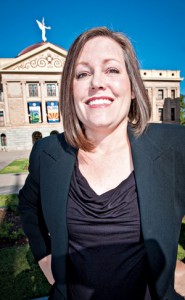
(Voted Best Twitterer 2012)
Though she doesn’t know why she was voted this year’s Rising Star, Rep. Katie Hobbs says she is pleased to have won, especially since she was the only Democrat nominated for the honor.
“It’s really an honor to be recognized by my peers,” she says.
Elected to represent Legislative District 15 in 2010, Hobbs distinguished herself by being the only freshman Democrat to have a bill signed into law in 2011. She repeated the feat this year with a second bill signed by the governor, which eliminates a redundant part of the process CPS had to go through in order to remove a child from a home.
Hobbs, a social worker for 18 years before joining the Legislature, is most proud of her work on the House Health and Human Services Committee, where she expressed concerns over legislation on topics like food stamps and foster care.
“My Republican colleagues were able to see the problems with them and those bills died,” she says.
Hobbs said she actually had ambitions to run for the Legislature for quite some time before she ran in 2010. In 2004, she started working on various campaigns, including that of former Sen. Kyrsten Sinema, Sen. David Lujan and House Minority Leader Chad Campbell, trying to position herself to run for office.
Although she wasn’t necessarily planning on it, when Arizona’s redistricting process put her into the new Legislative District 24 with Campbell, Hobbs took it as an opportunity to run for the LD24 Senate seat.
While she said her original goal was to serve in the Legislature, Hobbs is careful not to limit herself.
“I just think if an opportunity opened I definitely wouldn’t say no. Running for one office is the way to position yourself for the next office,” she says.
Campbell said he is sorry to see Hobbs leave the House, but looks forward to seeing what her future holds.
“I think she is just someone who has established herself as a leader in the political scene in general. On top of that I think she is one of the most genuine people you ever meet in politics,” he said.
Hobbs lives in Phoenix with her husband, Patrick Goodman, her son, Sam, 13, and her daughter, Henna, 10.
• Hair (female)
Amy Love
Watch the video for our new Best Hair winners: “The Hair Up There?”

When it comes to styling her hair, Amy Love considers it much more than vanity even though vanity may play a small part in her effort to maintain its award-winning stature.
There is a more profound reason for styling her hair to perfection, one that involves the public trust in her position as an Arizona Supreme Court liaison to the Legislature.
“It helps me get meetings with members,” she says.
In other words, Love’s hair is a statement about who she is and what she is about. It precedes her conversations with legislators and can possibly even open doors with those who perhaps wouldn’t give her more time in the past. It’s a presentation strategy that has paid off, she says. So what’s her hairstyle success philosophy?
“I’m from Texas: The bigger the better. Words to live by, the Golden Rule,” Love says.
Love is proud to say that her dark brown hair is currently all natural and she has no plans to color it, which could possibly affect her credibility with legislative members who are known for their authenticity.
“Not at this point. I only have one or two gray hairs,” she says.
Love, originally from Dallas, graduated from ASU and worked in different areas of Arizona government before taking her current position with the Supreme Court in 2011. She says she enjoys her job, which focuses mainly on informing legislators which issues are important to the functioning of the court. And she enjoys working with her office’s small staff, most of whom are cordial and professional.
But it’s sad to say that not everyone appreciates Love’s hair as a statement of her outgoing nature and professionalism. When she curls it on occasion, one of her male co-workers will tease her saying that it looks like she put her finger in a light socket.
But those kinds of senseless comments, especially from men, don’t bother her, Love says. She regards them the same way she regarded her older brother cutting the hair off her Barbie Dolls — childish. After all, it’s impossible for men to relate to the desire for women to make every day a great hair day, she says.
Love, for now, has no plans to file a formal complaint about the “infamous,” light socket comment. But Rep. Chad Campbell, House minority leader and the winner of the 2012 Best Hair award for men, says he will consider placing follicle-related issues on the agenda next session. That’s when things could get hairy.
• Hair (male)
Rep. Chad Campbell
Watch the video for our new Best Hair winners: “The Hair Up There?”

(Voted Best Democratic Representative — 50th Legislature 2012, 2011)
(Voted Best Democratic Representative 2009)
House Minority Leader Chad Campbell’s mission to win Best Hair (male) in the Best of the Capitol Awards began the first day of the 2012 legislative session with a bold declaration that he would win the award.
It was time that men with shorter hair were finally in the running to receive such a prestigious award, Campbell says, stopping just short of calling previous judging discriminatory.
“I started campaigning for this on the first day of the session,” he says.
But it appears that Campbell, 39, possesses an even deeper motivation. He might be leading a movement of many more “short” haired men (i.e. bald) stepping up to compete for the award in the future.
“We need to have a revolution in this category for those of us who have shorter hair,” Campbell says.
So far, however, Campbell says he has no plans to “occupy” the Arizona House of Representatives, nor does he have immediate plans to introduce legislation on hair issues next year. But he says he would consider it.
“I don’t claim to speak for anyone else on this issue,” Campbell says cautiously.
Campbell, a Phoenix native serving his sixth year in the Legislature, is well acquainted with grass roots campaigns and claims that the campaign to win the award was strictly word-of-mouth with a zero-based budget. He says he won hearts of the judges on the basis of popularity and style.
“I never had a hair out of place and I was the only one running who could claim that. And that’s a pretty strong argument with the voters,” he says.
Another factor that may have helped Campbell win is the constant grooming that keeps his hair manageable even on hot, windy days. In fact, it’s so well-trained that even baseball caps don’t disturb it.
“It took a lot of work to win this award,” Campbell says.
An avid outdoorsman, Campbell says that short hair helps keep him cool when he‘s riding down the road in his Jeep or churning up trails on his mountain bike, whether he’s wearing a cap or helmet.
“Your head gets used to it pretty quickly. You don’t have to worry about helmet hair,” he says.
Campbell was married last year and says that his wife also likes his “short” style. And perhaps an underlying reason why Campbell made such a strong move to seize the award was to refute a long-standing myth that long hair somehow gives men more strength.
• Twitterer
Rep. Katie Hobbs (@katiehobbs)
Watch the video for the 2012 Best Twitterer and Rising Star: “Hobbsolutely Non-Stop”

(Voted Rising Star 2012)
Rep. Katie Hobbs says it’s no wonder she won this year’s Best Twitterer award. The secret, she says, is the formula that goes into crafting her tweets.
“It’s the right combination of information and snarkiness,” the Phoenix Democrat says.
“Plus, I use correct spelling,” Hobbs says, referring to the occasionally spelling-challenged tweets of her Democratic colleague and fellow Best Twitterer nominee, Rep. Ruben Gallego. “Come on, Ruben. You graduated from Harvard.”
Hobbs joined Twitter in March 2009 and quickly put it to use in her political career. The best thing about it, she says, is the way it allows her to connect with supporters and keep a vibrant conversation going with constituents.
Aside from sending messages to her more than 1,100 followers, Twitter has also become her main source for news.
“I follow news outlets and reporters on Twitter, and I’m always watching out for stories that people are tweeting about,” she says.
Hobbs says she’s most proud of topping the Goldwater Institute, which was also nominated for the award. The conservative think tank’s followers outnumber Hobbs’ by about seven-to-one.
“It’s really sad they couldn’t parlay that into a win,” Hobbs says.
But it hasn’t always been happy tweeting for Hobbs. She says her lowest moment was when the “auto-correct” function on her phone changed a tweet about Rep. Debbie Lesko “shutting down debate” on a bill to something far more crass.
Hobbs says her less Twitter-prolific colleagues should take a lesson from her and step up their game, especially during the throes of election season.
“I don’t think it will make or break a campaign, but it attracts a more-involved type of voter,” she says.
• Person to Have on a Golf Foursome
Kathy Senseman
Watch the video for 2012 Best Person to Have on Your Golf Foursome: “Eye of the Tigress”

(Voted Best Lobbyist (female) 2011)
The legend of her long drive must have propelled her to the top, Kathy Senseman says, because the only golf she has played in recent years is the miniature type at Castles and Coasters with her two daughters.
“I rock the hole-in-one,” she said. “I have mastered the windmill and I’m pretty good at the volcano too.”
Senseman says her golfing activity dropped off sharply when she started having kids in 2003, but “back in the day,” when she was working with Southwest Gas, Senseman says she was the scramble master, combining a powerful swing with the advantage of a closer women’s tee box.
“I can knock the snot out of the ball. Sometimes they give you like a 50- or 60-yard advantage and then if you can knock it 200 yards, guys think you can really play golf well when you do that,” she says.
Steve Rich, with Aiken Schenk law firm, says he used to play golf with Senseman in tournaments several times a year and confirmed that her skill and her sense of fun was always a welcome addition.
“Her golf game is a lot like her as a lobbyist: straightforward,” he says, which translates into a long drive but with the drawback of a lack of “sensitivity” on the green.
Regardless of why, Senseman jokingly says that she considers it the honor of her career to beat Russell Smoldon, manager of state and local government relations for Salt River Project.
Smoldon won the same category last year and was nominated again this year.
“It sucks losing to a girl, doesn’t it?” she says.
• Coordinated Campaign
Jerry Lewis during Recall
Watch the video for Best Coordinated Campaign: “Lewis’ Just Cause”

De-throning a political goliath like Russell Pearce took more than just the efforts of a previously unknown Mesa school administrator, and Sen. Jerry Lewis is quick to give credit to those who helped him win last year’s historic recall election.
Lewis’ close friends and political allies Dea and Tyler Montague played a key role in getting Lewis to even consider running. They approached Lewis about running as soon as the recall election became inevitable.
“They came and said, ‘hey look, the recall is complete. It’s going to happen. The governor is setting a date. We need a candidate,’” Lewis says.
While Lewis was pondering the request, it became apparent to him that the community was eager for change and that his potential campaign would have plenty of support.
“Once people realized I was considering it, I got calls from different politicians in the Arizona Legislature, and from different political offices around the state that said, ‘hey, you really ought to do this, you’re the right person, you could really make a difference in the Senate, and this would be a good thing for you,’” Lewis recounted.
“Every day there was someone new. Emails would come, texts would come, phone calls would come saying ‘hey I hear you’re considering this. Let us know. We’ll support you.’ The business community rallied very quickly and came in with lots of donations. A lot of personal friends were asked what they thought, and they all said, ‘you know what, we need a change. We need a more civil dialogue at the Capitol,’” he says.
Like any campaign, it took a lot of hard work from staffers and volunteers. But the promises of support made when Lewis was only considering his run evolved into the effort that ultimately delivered him the election.
And while political observers likely considered Lewis’ election odds long when he announced his candidacy in July 2011, Lewis felt he could prevail from the early days.
“Honestly, I felt that way from the very beginning, because I knew the cause was just,” Lewis says.
• Dressed (male) & Shoes (male)
Sen. Jack Jackson Jr.
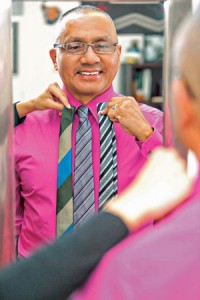
When Sen. Jack Jackson, Jr., D-Window Rock, learned he had captured both Best Dressed (male) and Best Shoes (male) in the Arizona Capitol Times Best of the Capitol Awards, he said, “And to think I managed to be the sharpest-dressed-man on a public servant’s salary.”
Indeed, it’s hard to determine what makes Jackson more proud: the fact he managed to craft award-winning couture on the $24,000 per year a legislator makes or the fashion skills of his husband and style advisor, DB Bailey.
However, Jackson, a Navajo and one of just three Native Americans in the Legislature, says he and Bailey are most proud of making a fashion statement on a budget. “We wanted to have a lot of fun with my wardrobe and blaze ahead in the hope of winning the awards because I knew, even with the tone of conviviality engendered by President Steve Pierce, it was going to be a challenge to make an impact legislatively this session,” Jackson says. “I also just wanted to give everyone a morale boost and a pop of color.” Jackson noted other legislators, including those across the aisle, followed his lead and sharpened up their own wardrobes.
Jackson, who’s campaigning for a second Senate term in the newly drawn Legislative District 7, has an overall impressive record. He can point to a lifetime of public service as evidence.
Jackson worked in Washington, D.C. for 12 years in the Native American policy sector in roles ranging from deputy director of the Navajo Nation Washington Office to director of legislative affairs for the National Minority AIDS Council. He also worked with the National Indian Education Association and the National Congress of American Indians before returning to Arizona in 2002 to successfully run for the Arizona Legislature.
That victory ensured Jackson and his dad, longtime legislator Jack Jackson, Sr., would jointly serve as representative and senator for Legislative District 2. It’s believed to be the first time a father and son have served in a state legislature together.
Jackson next served as executive director of the Arizona Commission on Indian Affairs, until resigning in 2005 to run unsuccessfully for Congress. But now, Jack is back and pairing Native inspired pocket squares and vintage ties to honor his heritage and bespoke bravado. And, with tongue firmly planted in cheek, to campaign hard — and win — Best of the Capitol. Jackson concluded, “I take the term ‘represent’ to heart. I’m honored to be the voice of my constituents at the Arizona Capitol. We happen to believe that includes turning it out sartorially. I would not have won this award without the loving guidance of my husband.”
• Capitol Officer
Ron Gill

Ron Gill was genuinely surprised when informed that he had been named Best Capitol Officer in the Arizona Capitol Times 2012 Best of the Capitol contest.
“You mean I won?” Gill says. “I knew I had been invited to the (June 12) event, but I didn’t realize that I had won. I guess I should have figured that out.”
Gill serves as sergeant at arms in the Arizona House of Representatives, a position he has held for eight years. His primary responsibility is to assure that procedure and protocol are followed on the House floor during a session. Gill oversees the daily goings on as lawmakers debate and craft legislation. At other times, he assists in providing security for all 60 members, and keeps a lookout for building maintenance needs. He maintains his office in the members’ lounge on the second floor.
Gill, who spent most of his life in manufacturing and industrial engineering, moved to Arizona from Cleveland in 1986 for family health reasons. A lobbyist who is no longer in Arizona helped him land a security job at the House in 2001, and later he was promoted to sergeant at arms.
“Rounding up members can be quite difficult, especially going into third read and final passage,” Gill says. “They have to be in their seat to cast a vote. They can’t be wandering around the floor.”
The most rewarding part of Gill’s job? “Introducing the governor on the opening day of the session,” he says. “It’s a thrill.”
• Republican Representative — 50th Legislature
Rep. Amanda Reeve

Rep. Amanda Reeve claims she doesn’t know what makes her the best, but in conversation about her philosophy as a legislator, some reasons begin to surface. It’s likely her policy of holding stakeholder meetings that sometimes run for several hours that gained her the favor of the Capitol community.
“I really believe in talking to the people directly impacted by the legislation so we can avoid any unintended consequences,” she says. “I’m not an expert on everything, obviously.”
Unlike some of her colleagues, who say that having too many varying viewpoints can lead to nit-picking or just complaining, Reeve says she tries to bring as many people to the table as possible to get those different perspectives.
However, she says that sometimes, she does have to be firm to keep everyone in line.
“Sometimes I have to say ‘alright, I’ve heard the complaints, let’s move on,’” she says. “And sometimes people can get really passionate and worked up, and you have to call a time-out.”
Not all interest groups like her dedication to the stakeholder process. Reeve says there have been times where she has killed her own legislation because she decides it needs to be more thoroughly vetted — much to the dismay of the people pushing for the bill.
“I maybe get more hands-on than I need to,” she says.
However, she says her philosophy is articulated in a Thomas Jefferson quote she has on a magnet in her office: “Every difference of opinion is not a difference of principle.”
• Democratic Representative — 50th Legislature
Rep. Chad Campbell

(Voted Best Hair (male) 2012)
(Voted Best Democratic Representative — 50th Legislature 2011)
(Voted Best Democratic Representative 2009)
Now a three-time recipient of the title of Best Democratic Representative, House Minority Leader Chad Campbell muses that it may be his open mind and open doors that help him get the votes.
Campbell says his priority, when approaching legislation, is to consider each bill or each measure on its individual merits rather than any predetermined ideological standpoint.
“We all get caught up in partisan politics and the ideological battles, and I include myself in that,” he says. “But individual issues get lost, because they get caught in partisan scope. I think the voters are frustrated with that.”
As an example, Campbell says his perspective on homeowners associations has shifted since he’s been at the Legislature. At first, he says, he had a very negative opinion on HOAs and thought they needed very strict regulation from the state.
Over time and after speaking to people on different sides of the issue, he says he softened his stance and now wants the state to give HOAs more of an ability to govern themselves. Tax regulation is another position that Campbell says is more nuanced than some may expect from a Democrat.
“I don’t approach it as raising taxes or not raising taxes, but as comprehensive tax reform,” he says, highlighting the issue to which he has been the most dedicated as a lawmaker.
But beyond his approach to bills, Campbell says it’s important to him that after the gavel has been struck and everyone walks out of the chamber, he has a good relationship with his colleagues in both parties.
• Dressed (female)
Eileen Klein

(Voted Best Hair (female) 2011)
Just before Gov. Jan Brewer’s recent trade mission to Europe, Eileen Klein, Brewer’s chief of staff, researched the style of clothing worn by Europeans. She wanted to know what to wear so as not to stand out; yet she wanted to appear professional.
That’s because Klein takes her presentation seriously and wants it to say that she is professional, sophisticated and classy.
“I think it’s just the way I am,” Klein says.
The roots of her desire to be well-dressed go back to her mother and father who took pride in how they dressed and passed that on to their daughter. It was part of the family tradition, she says.
“My mom has always been beautifully trimmed out and my dad had a sense of style as well,” she says.
Klein, 46, says she likes outfits that have class and are simple at the same time. Of course, she wants to appear attractive and feminine. All of that is filtered though a conservative mindset because she wants her appearance to honor the name of the administration and of the Capitol. With her many years of service in Arizona government, those instincts have become second nature.
From what her co-workers say, Klein hits the mark with her intentions.
“She dresses so fabulously. She is always professional, crisp, clean and beautiful,” says Susie Myers, administrative assistant to the governor. “At the same time, you see in her personality that she is sincere and genuine.”
But Klein has learned something of the rough-and-tumble world of politics inside the Capitol. Some of the furniture reflects the rugged individualism that made the state great. But it isn’t always the best for fine clothes.
“Some of the furnishings aren’t the most sophisticated and some of them demand durable (wardrobe)” Klein says.
Although Klein appears to impress others with her wardrobe, she says that’s not really her intention.
“It’s not meant to impress. I just want to be dressed appropriately,” she says.
• Shoes (female)
Kyrsten Sinema

(Voted Best Dressed (female) 2011, 2010, 2009, 2008, 2006)
(Voted Best Shoes (female) 2011, 2010)
(Voted Best Democratic Senator — 50th Legislature 2011)
(Voted Best Democratic Representative 2010)
(Voted Best Quote 2010)
(Voted Best Twitterer 2010)
For Kyrsten Sinema, running marathons has become a passion that complements her life while she also runs for public office. She says running marathons takes determination, patience, persistence and a good pair of shoes.
“It’s one of the best preparations for running for Congress,” Sinema says.
Sinema, a previous winner for Best Shoes, has a lot of shoes in various styles that she wears to match her outfits.
“The whole purpose of having shoes is to wear them. I can’t imagine having shoes and not wearing them,” she says.
Does she know how many pairs she has?
“No, it doesn’t matter. I haven’t counted them,” she says.
Sinema resigned from her Arizona Senate seat in January to run for the U.S. House of Representatives, so she is not seen as often around the Capitol in heels. For the time being, she has traded them for running shoes. Running, she says, helps her focus her mind and body on finishing the race. For those shoes, functionality wins over style.
“When you’re buying running shoes you should not consider fashion at all,” she says.
Sinema’s favorite shoe is by Brooks and is called Green Silence. It is eco-friendly and fits in nicely with her views on the environment. They are small, flat and close to the ground, giving her the feeling like she is running in bare feet, which has helped to alleviate her knee problems.
But when she’s going door-to-door campaigning, Sinema dresses all the way down to outright comfortable, wearing flip-flops.
“I’m a native Arizonan. If I have an opportunity to keep my feet uncovered I do it,” she says.
• Staffer
Victor Riches

Arizona House Majority Chief of Staff Victor Riches considers his recognition as Best Staffer an award for the entire House staff.
“I think it’s really just a reflection of the House staff in general. I think it just shows that the House as a whole really does a good job working with members and stakeholders,” Riches says.
The most important thing for any of the policy staff members in the Legislature is to work with members to make sure that the most important policy goals are being achieved, he says.
“Our big policy issues this last cycle were balancing the budget and starting to pay down debt and passing a jobs bill. I think we were very successful in all those endeavors,” he says. “And whatever role I can play in that is all I’m here to do.”
While he touts their achievements, Riches says when the legislative session begins in January, he and the rest of the policy staff members have their hands full.
“The session always starts with 1,200-1,300 bills,” he says. “Creating, to the extent possible, positive policy out of myriad ideas is always a challenge.”
He adds that it is also part of his job to make sure all the pieces of House operations are working together fluidly.
“I think the thing that people forget about really is how many people really do come together in a place like the House to make everything happen. We have a great staff in the House.”
• Handbag
Sen. Michele Reagan

(Voted Best Handbag 2011)
(Voted Best Republican Representative 2009 (2nd Place))
For Sen. Michele Reagan, the art of being an effective legislator takes meticulous planning in order to achieve precise execution. That’s why every Sunday she lays out her outfits for the week and chooses a handbag that will complement each one.
“I randomly pick them. I rotate them and I don’t use the same one more than a week,” says Reagan, a Republican who represents Scottsdale.
That means Reagan has to have about 20 handbags — one for each week of the session give or take a few — ready to accessorize whenever she needs one. But she’s not sure how many are in her dressing room-sized closet.
“I’ve never counted them. I don’t want to know. I know that I have every color and some with multiple shades of color,” she says.
Does her husband know the count?
“Oh God no. He doesn’t even go in the closet.”
Of course, the all-important handbag is not just for convenience. It’s a fashion statement and Reagan’s are no different.
“I kind of get a kick out of trying to find the best bargain for designer handbags,” she says.
Few, however, offer a political statement.
“I generally don’t carry those to the Capitol. I reserve them for elections or for a Republican function I’m going to,” she says.
And Reagan emphasizes that none of her handbags go to waste. In the spirit of conservation, she recycles them by giving them to charity or to her niece who recently told her that she wanted a French manicure and a Coach handbag.
“I am so happy you’re my niece,” Reagan told her.
• Republican Senator — 50th Legislature
Sen. Rich Crandall
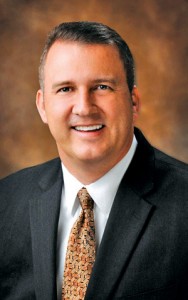
Sen. Rich Crandall, R-Mesa, rarely gives floor speeches.
That suits him well, since he prefers to work away from the spotlight.
That strategy has produced several important education measures during the past few years and apparently made him popular with Best of the Capitol voters.
Crandall, chairman of the Senate Education Committee, likes to build coalitions behind his legislative priorities. That’s one reason why most of his bills get broad support.
That allows him to navigate through complex subjects, such as student promotion to the next grade level or assigning a letter grade to schools, without having to engage in mutually-destructive battles.
That’s also likely another reason why he was asked by several people to reconsider his earlier decision not to seek re-election. He ultimately decided to run again this year.
Veteran lobbyist Barry Aarons said he likes lawmakers who can tackle complex subjects and yet draw people into an agreement, reach a “win-win situation” and pass a bill.
“That’s what makes a good legislator,” Aarons says. “He (Crandall) has done that many, many times.”
• Democratic Senator — 50th Legislature
Sen. Paula Aboud

Sen. Paula Aboud, a Democrat from Tucson, champions issues important to her region, and sometimes finds herself fending off proposals she believes would negatively impact southern Arizona.
The former college athletic coach and teacher who’s known for not mincing words, first joined the Senate in 2005, when she was appointed to replace Gabrielle Giffords, who had left her legislative seat to run for Congress.
Her administrative assistant, Nancy Boyd, says Aboud has shown her that there are many paths to becoming an effective senator.
“I always thought it was necessary to be a lawyer in order to be a senator,” Boyd says. “Being a former athletic coach and a former high school teacher, she has demonstrated her true leadership skills with her caucus, staff and colleagues. I now know that a person with past experiences of coaching and educating make for a great senator.”
Just about everybody can agree: Aboud doesn’t shirk from representing the values of her caucus.
Indeed, Aboud has been at the forefront of some of the biggest political fights in the past decade, including the battle over same-sex marriage, further restrictions on abortion and budget cuts to programs that serve vulnerable populations.
As the ranking Democrat on the Senate Appropriations Committee, Aboud saw to it that Republican-sponsored budgets were vetted, particularly when the majority decided to limit public testimony or not hear it at all.
Although she is term-limited and retiring from the Legislature this year, Aboud has left quite an impression on Boyd.
“I will always remember her by her sensitivity to people, especially the elderly, and by her emotional strength shown in the aftermath of the Tucson shooting tragedy,” Boyd says.
• Administrative Assistant
Mary Peralta

(Voted Best Administrative Assistant/Secretary 2011, 2010, 2009)
Upon learning of her fourth consecutive win for Best Administrative Assistant, Mary Peralta took the opportunity to give out high praise – to other people.
“It’s all comes down to two people: Dr. Kyrsten Sinema and Sen. David Lujan,” Peralta says. “They have inspired, encouraged, motivated and taught me.”
Peralta, who is away from the Capitol recovering from knee surgery, served as Sinema’s administrative assistant before Sinema resigned to run for Congress this year. Peralta now works for Lujan, her replacement.
As evidenced by reader response, Peralta must be a supremely talented scheduler. She says she actually enjoys the challenges posed by scheduling multiple people in different locations.
“I love scheduling. And most people hate it, especially when it involves more than one person,” Peralta says. “It is about solving a puzzle… just like in high school balancing chemistry equations.”
While Peralta may have found her groove in the world of getting people to the right places on time, it isn’t the only thing she has a knack for. Before working at the state Capitol, she spent 15 years as a corporate chef in Manhattan. She says she still uses her culinary skills for events and parties.
“I still love to cook,” Peralta says. “But I’m also a voracious knitter, reader and I’m starting a new collection of recipes. That’s what I’m working on while I’m away from the Capitol.”
• Person to Have Attend Your Get-Together
Russell Smoldon

(Voted Best Person to Have on Your Golf Foursome 2011)
Someone once asked Russell Smoldon why he has been a lobbyist for so many years.
“Because I can’t get a real job,” Smoldon said jokingly.
Smoldon, senior director of government relations for Salt River Project, thinks for a second and then says his perfect job, in fact, would have been a bullpen catcher for the Hawaiian Islanders, a minor baseball league team. He would have gotten paid to live in Hawaii, never have to play in a game, and would have stayed in Hawaii when the team was on the road because bullpen catchers don’t travel. Unfortunately, the team broke up, he laments.
Smoldon, 53, surmises that he won his award this year because he uses his wit to lighten the serious nature of business at the Legislature and at SRP. He has been a lobbyist for more than 20 years and is well known for both his professionalism and his sense of humor.
“SRP is the primary provider of water and electricity in greater Phoenix and it can get tense at times, but I try to make it fun,” he says.
Smoldon says his humor and wit get him invited to a many get-togethers, some of which he hosts for organizations such as the Republican Party and chambers of commerce. In the past, he has hosted the Best of the Capitol Awards, as he will again this year.
He says laughing at himself usually loosens up others around him so that they feel more comfortable with each other, which opens up channels of communication.
“I make fun of myself first and then it seems that you can make fun of other people,” he says.
• Lobbyist (male)
Don Isaacson

(Voted Best Lobbyist (male) 2011)
(Voted Best Lobbyist 2010)
For some the legislative process is long, arduous, and fraught with surprises that often end in compromises that are not particularly satisfying to the parties involved. But for Don Isaacson, the challenge of navigating the constantly shifting political waters makes the process exciting, engaging, and sometimes even fun.
Isaacson, 63, a lawyer and managing partner of the law firm Isaacson & Moore, P.C., has been practicing law since 1973. He and partner Norm Moore serve a variety of clients including banks, insurance companies, water companies, health care providers and real estate companies.
“We do a broad range and it’s the enjoyable part of what we do. We are before every committee and there are very few issues we don’t get involved with,” Isaacson says.
Isaacson credits a large part of his success to the professional nature of his clients and the support of Moore, adding that he and his partner are extremely sensitive to avoiding conflicts of interest between clients.
“Part of it (success) is the clients who come to you over time. You really can’t pick your clients,” he says.
“We have great clients and we are pretty careful about conflicts,” Isaacson says, adding that his law firm has turned down business that might conflict with an existing client to avoid being in the position of having to favor one over the other in the legislative process.
“We grew on a non-conflicting basis,” he says.
Isaacson, originally from Illinois, is married with three children. He characterizes himself as “people-oriented” and engaging, which are qualities that he feels are necessary to operate in the political process with legislators from a wide variety of backgrounds.
“You do have to be people-oriented. If you like meticulous desk work, you are not going to enjoy the legislative process,” he says.
When asked if he is outgoing and perhaps even gregarious, he says “on the Russell Smoldon scale of gregariousness he’s a 10 and I’m probably a five.”
Where many people avoid dealing with change, Isaacson says he enjoys that because it is one of the best and most challenging parts of his job.
Amendments can come from left field and sudden opposition can emerge anywhere in the process regarding a piece of legislation, he says. While this can be frustrating, it also forces him to be at his best convincing legislators to look favorably on the positions of his clients. And sometimes it gets a little ugly.
“It is a contact sport (politics). Someday they might require helmets because it’s pretty brutal at times,” Isaacson says.
• Government PR Person
Robbie Sherwood

Robbie Sherwood suggests it is somewhat ironic that he was named the Arizona Capitol Times’ Best Government PR Person because he’s not on a government payroll anymore.
His most recent gig was as chief spokesman in Greg Stanton’s successful campaign for Phoenix mayor last year. Sherwood, a former newspaper reporter, says it was a tough campaign. “It got a little messy between the two camps,” Sherwood says, referring to the Stanton and Wes Gullett campaigns. “Wes (Gullett) was a good friend, but I backed Greg for mayor. This is a small town and I don’t want to lose any friendships.”
Previously, Sherwood served as a spokesman for the U.S. Attorney’s Office in Phoenix. Before that, he was the senior adviser to Congressman Harry Mitchell, a Democrat who lost his seat in 2010. “I wasn’t really his spokesman, but I was his eyes and ears in the district, helping coordinate his rn to bsn online program outreach,” Sherwood says. “I was a dilettante. When needed, I had many responsibilities.”
In January 2011, Sherwood says, he threw caution to the wind and started his own company — Earned Media Consulting. One of his first clients was the U.S. Attorney’s Office, which needed media assistance after the shooting of Congresswoman Gabrielle Giffords.
A former political reporter for The Arizona Republic, Sherwood left the newspaper in November 2006, at a time when “I sensed the business was changing, had become less fun.”
How did he feel about switching from being a newspaper reporter to the so-called “dark side” of becoming a political PR person? “A lot of people think I went legit,” Sherwood says.
• Person to Have Lunch With
Sen. Don Shooter

When asked to deliver the Senate’s daily prayer in March, Sen. Don Shooter, a Republican from Yuma, kept it short.
“God help us, amen,” he said.
The prayer is vintage Shooter. The Republican is widely regarded as the Senate’s funny man — and for good reason. First of all, he wears funny hats, and he’s got all kinds of them. And if he ever gets the green light to wear a Mariachi outfit to the Senate floor, he probably will. That’s probably why Capitol Times readers chose him as Best Person to Have Lunch With. Who doesn’t want to have a good laugh over their sandwich, burger or burrito?
However, it’s not that Shooter doesn’t regard his work seriously. As chairman of the Senate’s budget panel, he and other legislative leaders hunkered down weeks before the session began to prepare a budget plan. And they succeeded in persuading the governor to adopt a more cautious spending plan.
But his comic bone helps to ease the tension at the state Capitol.
“He has the rare combination of work ethic, intelligence, empathy and a whole lot of mischief!” says lobbyist Gretchen Jacobs.
In 2010, Shooter, a farmer, developer and former chairman of the Yuma Tea Party, defeated incumbent Democrat Amanda Aguirre to represent his district at the state Capitol.
Shooter, a freshman legislator, then rose to become chairman of the influential Senate Appropriations Committee. He’s seeking re-election this year.
• Lobbyist (female)
Janna Day

For Janna Day, politics is a family affair. So it’s no surprise that lobbying the Legislature on behalf Fof her clients is her chosen profession.
“I grew up in a family that was involved in politics and I was always very interested in it,” she says.
Day, who works for Brownstein Hyatt Farber Schreck LLP, considers herself to be enthusiastic, patient and well prepared to represent the needs of her clients before Arizona lawmakers.
“I tend to be more substantive, well researched, well prepared and pretty straightforward,” Day says.
She regards these qualities as necessary because often her time with legislators is limited and she has to make the best of it working on behalf of her clients. She says she needs to know the arguments for and against her clients’ positions so that she can educate as well as convince lawmakers that their positions are valid.
“You might only have one opportunity to talk to folks. You might only have one shot, so you have to try to forecast about what they might say,” Day says.
“I like to address the negative up front,” she adds.
Day says she likes the fact that she is not a single-issue lobbyist because she enjoys representing her clients on a variety of issues including taxation, environment, insurance and public records.
“I’m like the workhorse without grandstanding, doing the research, picking off the meeting, having my head down and doing my job,” she says.
Some of her corporate clients include Southwest Airlines, Humana and Anheuser Busch. But she also has smaller clients who likely do not have resources of larger ones, but who need representation all the same.
“Sometimes they can be more appreciative of helping them navigate the process,” she says.
Day, 43, wife of a fellow attorney and mother of four, says raising a family actually helps her in her profession because raising children takes patience, and so does working with legislators who can change their minds about issues, which can alter her strategy of representation.
“You have a certain level of patience from being at home,” she says.
As with other lobbyists, Day spends a lot of her time educating legislators on the issues and where her clients stand on those issues. Education, she says, is critical because without updated information, it can be difficult for lawmakers to see her clients’ point of view and vice versa. She considers education to be one of the most challenging and important parts of her job.
“You don’t want people in a vacuum making decisions about issues,” Day says.
• Political Operative
Chuck Coughlin

(Voted Best Political Operative 2010)
(Voted Person You’d Least Want as a Political Opponent 2008, 2006)
Chuck Coughlin returned to form this year with Arizona Capitol Times readers and reclaimed his perch as Best Political Operative after losing in a close vote to Danny Seiden in 2011. He jokingly implies that maybe he is such a deft operative that winning the award yet again is all part of a covert plan.
“I’m a little chagrined. I was hoping someone else would enjoy the spotlight,” Coughlin says. “But perhaps this is all a conspiracy and the real guy is off working while the spotlight is on me.”
In all seriousness, Coughlin actually sees his role as that of an adviser and spanner of ideological and partisan divides. “I’m a jockey, I’m not the horse. I’m here to help people and guide them through the process,” he says. “It’s people like me in my industry that help build bridges. That’s the stuff I’ve been most proud of in my life.”
Well-known in Valley political circles for advising high-profile candidates and working on major issues, Coughlin may seem like he’s never lost a campaign, but that isn’t the case. He values the times he hasn’t been successful.
“The way you gain experience is by getting your butt kicked,” he says. “Losing teaches you more than winning. I don’t like winning so much as I hate losing.”
Coughlin says he has a direct and honest style that can be “disarming” to some people, but he doesn’t think anyone who is “mentally healthy” should be intimidated by him. In fact, when asked to describe himself with a term other than “political operative,” he called himself a “best friend.”
“I’m someone you go to. I’m not going to walk away when things get hot, I’m not going to leave you,” he says.
Coughlin describes the political environment in Arizona as “healthy” and is attracted to it because of its brash nature. “I love Arizona politics because it’s on its sleeve,” he says. “We’re the youngest (contiguous) state and we act like it. We’re going to demand attention to a problem.”
Looking into life after politics, Coughlin says he’d like to coach or teach American history. He says he’d rather teach about ideas over skills. “You get in a contemplative mood around 50, where you start thinking about doing less,” he says.
From his political experiences, Coughlin says the name of the game is trust. “That’s what we deal in, people have to know that what you say can be relied upon,” he says, while acknowledging that it isn’t all serious business all of the time.
“Sometimes you gotta remember to laugh,” he says.
• Political Website
Rum, Romanism and Rebellion

Earlier this year, Democratic political blogger Ted Prezelski found himself in a “darned if you do, darned if you don’t” situation when deciding whether to write about the accusations against then-Tucson lawmaker Daniel Patterson.
“It’s been tough lately, there have been incidents down here that have been hard to comment on and not be a jerk about it,” says Prezelski, who lives and blogs from Tucson.
Prezelski’s brother, Tom, had been bested during his 2008 House re-election bid by newcomer Patterson, and Ted wondered if any comment on the subject would be seen as him remaining bitter over his brother’s loss. He found out, however, that not writing about the subject also stoked ire among his readers.
“I had this weird thing where if I wrote about it people would say ‘you’re only writing about this because you’re still angry at Daniel,’” Prezelski says. “I ended up not writing a lot about it, and then it was ‘you’re defending him by not writing.’”
Prezelski started his blog, “Rum, Romanism, Rebellion” in early 2006. He chose the name based on its connection to Democratic politics and then-New York Gov. Grover Cleveland’s surprising victory in the 1884 presidential election over former Republican U.S. Sen. James Blaine of Maine.
Prezelski says that a preacher speaking in support of Blaine said to a crowd in New York City: “We will not vote for any party whose antecedents are rum, Romanism and rebellion.” This statement played heavily on the stereotype of the drunken Irishman and demeaned the Catholic faith of which many of the newly arrived Irish Americans were members. The gaffe was enough to give New York to Cleveland, and gave the Democratic Party its first president since James Buchanan was elected in 1856.
Prezelski decided the name’s connection to an improbable Democratic presidential victory would be perfect for his site, which he says “offers something different than a lot of blogs.”
Although he isn’t sure exactly why his blog has lasted so long while many others have failed, he says knowing people read and respond to his blog keeps him going. “I think part of it is that if you know people are actually reading you, then you want to keep going,” he says. “I get reactions from people.”
Whatever his motivation, Prezelski is happy that the “little bit” of effort he put into getting people to vote for Rum, Romanism, Rebellion has paid off. He considers his win as correcting an injustice.
“A few years ago I was up for it and I lost to Real Clear Politics, which kind of made me say ‘wait a minute, they’re not even Arizona,’” Prezelski says, half-joking. “So it’s good to right that horrible wrong.”
• Dinner
Durant’s

(Voted Best Bar 2012, 2011, 2010)
(Voted Best Place to Impress a Client 2012, 2011, 2009 (2nd place), 2008 (2nd place))
(Voted Best Dinner 2012, 2011, 2010, 2008)
(Voted Best Appetizers 2009, 2008)
(Voted Best Happy Hour 2009, 2008)
(Voted Best Place to be Overheard 2009, 2008)
(Voted Best Lunchtime Diversion 2009 (2nd place))
Chef Ken Giordano, who has been running the kitchen at Durant’s for 12 years, says the secret to the restaurant’s smashing success with customers and in Arizona Capitol Times Best of contest, is churning out good food day after day.
“It’s the consistency and the quality of the product,” Giordano says. “After 62 years, we get used to doing the same things well.”
And those “same things” include porterhouses, filets, New York strips and ribeyes, all cooked to order by Giordano and his kitchen staff. He says the most popular steak ordered is the 8 oz. filet mignon, but the seasoned chef reveals that isn’t his favorite.
“Generally, I’d recommend the ribeye,” he says. “It has a little extra fat to it, which adds flavor.”
Despite its reputation for great steaks, Durant’s doesn’t neglect the other side of the meal — which is some people’s favorite part — desserts. Giordano says that all of the restaurant’s delectable desserts are made in-house, and the plain and strawberry varieties of cheesecake are standouts.
In addition to the mood, stiff drinks and high-powered patrons, Giordano says the restaurant’s variety and good local following will keep it going strong.
“As far as steakhouses go, we’re a pretty good deal,” he says.
• Bar
Durant’s

Just like many Valley watering holes, the bar at Durant’s offers an in-depth selection of scotches, cognacs, bourbons, vodkas, wine and beers. What sets the establishment apart, however, are the men pouring the finest cocktails in the Valley, says Durant’s owner and general manager, Carol McElroy.
“The gentlemen who have been our bartenders over time have all been a very unique group,” McElroy says. “They know what it is to make an absolutely perfect martini or Manhattan and the difference between a gimlet and a kamikaze. A good bartender is really something of an artist.”
In fact, one of those artists who helped define the high level of service, John Loyola, recently passed away. Loyola’s work as a Durant’s bartender spanned three decades, from the 1980s through the early 2000s. McElroy recalls him as a “master.”
“There wasn’t a drink he didn’t know. People would try to stump him, but they never won,” she says. “He also had a great memory. Say you came in and wanted a Johnnie Walker Black. He would see you and remember it. If you sat down and looked up, there would be the drink, just the way you like it.”
McElroy identifies the martini as the house specialty cocktail at Durant’s, which is fitting giving the cool, swanky vibe of the place. She is a more adventurous drinker herself, revealing that she enjoys different drinks at different times depending on the meal and occasion.
From her time working at Durant’s, which began back in 1999, she says that Arizonans are split just about 50/50 on how they like their martinis. “Guests are split in the middle,” she says. “Arizonans are not all gin or all vodka drinkers.”
• Breakfast
Matt’s Big Breakfast

(Voted Best Breakfast 2010, 2009 (2nd place))
Matt’s Big Breakfast co-owner/manager Erenia Lara — also the other half of the “Matt” — was in rare form in discussing the restaurant’s win for Best Breakfast in Best of the Capitol. She prefers not to be in the limelight.
“You can call me the dishwasher and I’d be happy,” Lara says. “I totally appreciate the behind the scenes gig so much more.”
The success of the restaurant, says Lara, which opened in October 2004, is the fresh, local ingredients in the hearty breakfast fare, and the attention that Lara and the staff lavish on their customers.
“Our customers are the soul of Matt’s Big Breakfast. Some of them have been coming since we opened almost eight years ago,” Lara says. “We don’t take anybody for granted. I don’t care how busy we are or whatever is going on with our restaurant. We are always appreciative of the business.”
As for the food, Lara says Matt uses the freshest local ingredients in each day’s special. On a recent Friday, the special was chicken-artichoke sausage with local organic baby spinach. “There isn’t a day that Matt doesn’t put a lot of thought into the special,” she says.
“On behalf of Matt and the staff, we just want to thank everyone that voted for us. There isn’t one customer that we don’t appreciate.”
She does acknowledge that the downside of running a popular, but very small restaurant is that sometimes, there can be a bit of a wait for a seat. The busy breakfast service time for Matt’s is 9:30 a.m. to 12:30 p.m. To minimize the wait, Lara recommends coming in on Mondays, Tuesdays or Wednesdays or before or after the crunch time.
Lara spent a large part of the interview speaking about how appreciative she is of the customers.
“Even when they get cranky, I still love every customer,” Lara says.
• Lunch
Postino WineCafé

Postino WineCafé is celebrating its 10th anniversary this year, so it is fitting that readers would also recognize the restaurant with its first Best of the Capitol award for Best Lunch.
Postino, which now has three locations — Arcadia, Central Phoenix and near Gilbert and Elliott roads in the East Valley — started with its first location when the founding partners decided to renovate the historic Arcadia Post Office. Their aim was to build a foundation with “unique, approachable wines; simple, delicious food prepared with local ingredients; and a warm, edgy culture that brings everyone together.”
The restaurant’s wine menu features mostly boutique wines that range in price from $8 to $12. Different wines are offered at each location to allow patrons to taste a large selection.
Brunch is exclusively offered at the central location on the corner of Central Ave. and Colter St. Offerings go from the hearty Farm Scramble — a mix of potatoes, eggs, onion, cheese and herbs served with mixed greens and a tomato salad — to the lighter Grilled Foccacia, made with over-easy eggs, asparagus and a tomato salad.
To top off the brunch experience, the restaurant has drip coffee for the traditionalist, but also has some drinks for the more adventurous, such as the white peach bellini or the cucumber-honey lemonade.
• Awards Event
Governor’s Arts Awards
(Voted Best Awards Event 2011)
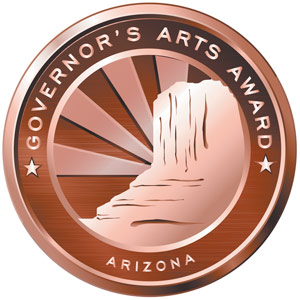 The Governor’s Arts Awards started its fourth decade this year in honoring individuals, organizations and educators in the arts community.
The Governor’s Arts Awards started its fourth decade this year in honoring individuals, organizations and educators in the arts community.
The event, which is put on by Arizona Citizens Action for the Arts and Arizona Commission on the Arts in conjunction with the Governor’s Office, has become a tradition for Arizona governors going back to 1981.
“Every governor since Bruce Babbitt has been actively involved in this event,” says Catherine “Rusty” Foley, executive director of Arizona Citizens Action for the Arts.
The event was envisioned 30 years ago as an opportunity for the business and arts communities, the Arts Commission and the governor to come together to recognize the importance of the arts in community life and the economy in Arizona, Foley says. “The arts is at least a half a billion dollar industry in the state of Arizona,” she says. “And that’s just the nonprofit arts community.”
As the economy has suffered and state budgets have been slashed, the arts has also suffered along with other activities that, Foley says, like the arts, contribute to community development. “Clearly, public funding for the arts has suffered in this budget environment like so many other activities that contribute to the public good have suffered,” she says.
Although there may be a perception that the arts community is overlooked by lawmakers, Foley says that isn’t necessarily the case. The Arizona Commission on the Arts was recently reauthorized by the Legislature for another 10 years, which is the maximum allowable amount of time. “I’m convinced that we have more support from legislators than anyone may have imagined,” she says.
Most of all, Foley says people support the event because it is a good time.
“It is an event that is enjoyable to attend because…it always features some wonderful artistic presentations by performing groups,” she says. “And frankly, it’s a lot of fun.”
• Capitol Lawn Event
Arizona Pipe Trades 469 Lunch on the Lawn

The way to people’s hearts is often through their bellies. And no one knows that better than members of the Arizona Pipe Trades 469, who on March 27 organized a barbecue at the state Capitol that the organization says attracted about 400 people, including 50 lawmakers.
No doubt some of them found their way (or were lured) by following the aroma of grilled hamburgers and hotdogs.
Israel Torres of Torres Consulting & Law Group, LLC, represents the union and was responsible for organizing the event on behalf of the union, which includes members from Tucson and Phoenix.
“It was an opportunity for the Legislature and our members to get together and meet each other and to learn what the Legislature is working on at the same time,” Torres says.
Torres estimates members of the union, dressed in bright orange tee shirts, served more than 600 hotdogs and hamburgers and sodas and bags of chips to attendees from a trailer equipped with four grills. The rig is also used to support fundraising events for state legislators’ campaigns backed by the trade union.
Union members also set up tables and chairs and displayed photos of construction projects completed by the union membership, demonstrating to legislators the value of organized labor, Torres says.
Torres characterized the lunch as a networking event not targeted at any specific issue, but rather to keep the membership’s agenda in front of state legislators in a non-confrontational way.
“It’s a lighthearted attitude. It’s a picnic,” Torres says.
• Fundraiser
Skate with the Divas — Sen. Reagan, Reps. Brophy Mcgee, Carter & Ugenti

Politicians have been known to do just about anything to get elected. One of the keys to getting elected, of course, is raising money for a campaign.
Sen. Michele Reagan and Reps. Michelle Ugenti, Heather Carter and Kate Brophy McGee held a roller disco and hit the rink dressed up as tough roller derby “chicks” late last year to raise money for their re-election campaigns.
Reagan says the lawmakers organized the Nov. 16 event as a fundraiser and celebration to thank the volunteers who work to get out the vote for candidates.
“We wanted to do something to thank the grassroots supporters,” Reagan said.
The event, held at Skateland in Mesa, emphasized “old fashioned fun,” in the theme of the 1970s, Reagan says. A DJ played oldies music while the guests ate “tons of pizza,” moon pies and Pixy Sticks. They washed it all down with old-time flavors of Shasta Soda and a little brew from the keg.
The legislators represent districts in the same general area in the East Valley and wanted to give their supporters a way to let down their hair and enjoy the music, food and skating.
Reagan said her parents were the hit of the fundraiser as they skate-danced arm in arm around the rink.
• Grassroots Effort
Planned Parenthood
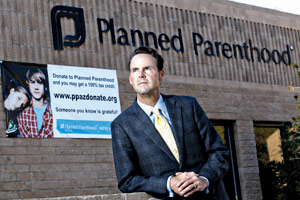
The debate about whether women’s contraception should be automatically covered under employers’ insurance plans became a major issue in Arizona this year as lawmakers passed and
Gov. Jan Brewer signed into law measures that limit women’s access to contraception and ban abortions after 20 weeks.
This so-called “war on women” led Planned Parenthood Arizona to form a grassroots effort to raise awareness on women’s health issues, says Michelle Steinberg, Planned Parenthood Arizona’s director of public policy.
“It was all about the assault on women’s health,” she says.
The campaign focused on inspiring supporters to lobby their representatives to oppose further cutbacks on funding for women’s health services and to vote against those representatives who support restricting contraception and abortion, Steinberg says.
The first rally took place March 28 at the Capitol and was attended by about 350 supporters — many wearing pink tee shirts — who want more access to contraception and abortion services. Fifty days later, there was another smaller event in the same place for the purpose of keeping in the issue in front of women voters during an important election year, Steinberg says. Democratic lawmakers spoke at the events, Steinberg adds.
To support the events, Planned Parenthood Arizona sent out thousands of emails to alert and educate their constituents and legislators of the negative effects the legislation would have on women’s health, Steinberg says.
• Cocktail Party
Politics on the Rocks

Twenty years ago, the idea of politicians using social media to befriend potential constituents or create fans would have been regarded as ridiculous, preposterous and downright embarrassing.
But that is what’s happening today in the world of social media/political networking. And Politics on the Rocks has capitalized on that trend by organizing high-profile cocktail parties for Republicans and promoting them primarily through social media such as Linked-in, Facebook and Constant Contact.
At the events, Republicans can meet and size-up local and national party leaders such as John McCain, Jeff Flake and Newt Gingrich in an informal setting at top-notch venues such as The Mint in Scottsdale and the Phoenician in Phoenix. Speakers give 10-minute talks (nothing scripted) and no teleprompters are allowed, which might rule out some speakers.
“It’s different when you meet your congressmen. People can meet them and decide for themselves,” says Charles Jensen, founder of Politics on the Rocks.
Jensen says attendance ranges depending on the time of year from 200-1,000 and the board of directors has a list of 50,000 social media contacts that it also uses to promote the events, which change place from month-to-month.
Jensen says he began Politics on the Rocks five years ago so Republicans could meet the movers and shakers of the party face-to-face. Past speakers include Ron Paul and Michele Bachman.
Jensen says he and his board do not profit from the events. It is strictly a forum to share views and strengthen the party. “And Democrats are invited as well,” he adds.
“We’re not out for glory or for our own egos. We’re out to make a difference,” Jensen says.
• Place to Impress a Client
Durant’s

Stepping into Durant’s through the restaurant’s well-known backdoor-kitchen entrance might give the impression that everything at the famous restaurant is open for anyone to see, but owner and general manager Carol McElroy says the place prides itself not only on great food and service, but also discretion for its patrons.
“Individuals can come, and have a lovely meal, conversation, work a deal — whatever is important to them,” McElroy says. “And when they leave there is no discussion about the who, what, where, when or why. That’s not our job. It’s a trust and I take that very personally.”
The seriousness with which McElroy approaches the relationship with her customers may be why Arizona Capitol Times readers chose Durant’s, yet again, for Best Place to Impress a Client. The place also is recognized this year as Best Bar and Best Dinner.
“Isn’t that a wonderful combination? It is a trifecta,” McElroy says of the honors.
She says that her staff seeks to create a relationship with the customers so they know that they will be properly taken care of on every visit. “Our servers are all lovely people and interested in people. They are the relationship developers,” she says.
Lessons learned running a successful restaurant for more than six decades can be carried over to just about any business, she says.
“That’s really what it is about,” McElroy says. “Regardless if it’s a restaurant, store or construction company, it’s about the ability to build relationships. We work towards that every day.”
• Watchdog Group
Sierra Club, Grand Canyon Chapter

The Goldwater Institute had owned this category for the four previous years, but that all changed this year with the selection by readers of the Sierra Club as the 2012 Best Capitol Watchdog Group.
“I have to say I’m shocked because there are all those groups with a lot more people and paid lobbyists and stuff, so I was just surprised,” says Sandy Bahr, lobbyist and director of the Grand Canyon Chapter of the Sierra Club.
Of taking the mantle from Goldwater, Bahr says: “I would like to do that with the bills that passed or didn’t pass.”
Bahr, a fixture at the Capitol, says her small organization aims to keep residents and lawmakers aware of bills that could impact the environment. “We try to watch what they (lawmakers) are doing and encourage people to participate,” she says.
For her, being an effective watchdog dictates physically being at the Capitol, working with lawmakers and listening to what’s being said.
“You have to be there. You have to engage to really find out what’s going on,” she says. “Talk to people, but more importantly, listen. It’s amazing what you’ll hear sometimes.”
She says the work of a watchdog is never done. “That is really the story on environmental work. There really are no permanent victories. You have to be constantly vigilant,” she says.
Even though several bills the Sierra Club opposed made it through the process and were signed into law by the governor, Bahr believes she is fighting a necessary fight.
“What we are working for is very important,” she says. “It’s the place we live, the air we breathe, the public lands we all enjoy. It’s a big part of what makes Arizona special.”
• PR Company
R&R Partners
 (Voted Best PR Person/Company 2011, 2010)
(Voted Best PR Person/Company 2011, 2010)
There is no doubt that R&R Partners is a top notch public relations company. After all, it has won the Best of the Capitol Best PR Company award twice before.
Matt Silverman, managing director of the Phoenix Office, says it’s probably due to the firm’s full-service approach. “We do it all,” Silverman says. “We see the total landscape when it comes to our clients because we have public affairs, government relations and marketing expertise. We really take a 360-degree view of the challenges that our client has. We approach them by not looking through one particular lens, and that helps make us smarter and enable us to not only help our clients with current challenges but also anticipate potential future ones, hoping to avoid them.”
In some cases, R&R spreads awareness about the positive things the client is doing, getting the attention of stakeholders and the media. On the other hand, some clients are facing a serious challenge. “Something bad is being said about them or something truly bad has happened to them,” Silverman says. “We help manage their reputation.”
What is not fully known is what the R&R name stands for. The firm was founded in 1974 by Sig Rogich. “He was the only R,” Silverman says. “There never was another R. One of the stories is that he wanted the firm to sound bigger so he called it R&R Partners. He’s no longer with the firm.”
A clever explanation, Silverman says, could be: “Robust Revenue,” or better yet, “Results & Revenue.”

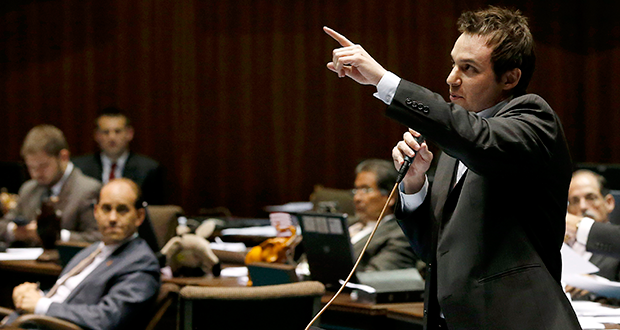



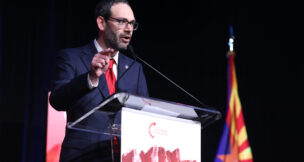





























One Response